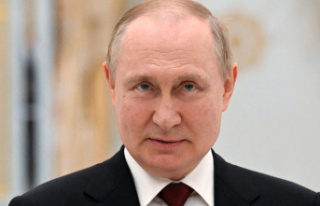"No surprise," says Robert Habeck, "although it's always annoying." In fact, the bang is limited, apparently it is exactly as Russian President Vladimir Putin expected days ago: gas deliveries via the Baltic Sea pipeline Nord Stream 1 will be reduced again on Wednesday morning - allegedly because there is now another turbine needs urgent maintenance (read more here). A pretext, criticizes the federal government. again.
It is this déjà-vu that makes Federal Economics Minister Habeck tremble: The renewed gas throttling is "no surprise" but it is "always annoying that Gazprom is putting forward other reasons," as he said on Monday evening in the ARD "Tagesthemen". "complained. "So that they don't even have the guts to say: We're in an economic war with you."
So what's left to hold onto? If one pretext is thrown out, the Kremlin creates a new one. And Federal Economics Minister Habeck is visibly annoyed by Putin's games.
But what calculation is the Kremlin pursuing with the delivery lottery, which quite obviously has no technical but political reasons?
According to Habeck, that's also obvious: Russia's president is trying to "weaken the great support for Ukraine and drive a wedge in our society. In return, he's fueling insecurity and driving up prices." It's a "perfidious game" in which Moscow tells "farce stories about these turbines" that just aren't true.
The confusion is beginning to have an effect, and the prospect of another cut in gas supplies caused the price of natural gas to rise further. On Tuesday morning, the reference futures contract TTF on the energy exchange in the Netherlands briefly jumped over 190 euros per megawatt hour - a level that was last reached in March, shortly after the start of the Russian invasion of Ukraine.
The uncertainty on the market is obviously great, as too many questions refuse to be answered. For example: will Nord Stream 1 supply volumes remain at 20 percent? Booted up again? Or even further throttled? As early as tomorrow, Putin could even completely cut off the flow of gas through the Baltic Sea pipeline. The only thing that is certain is that the gas may be flowing at the moment, but the crisis remains - and with it the fear of next winter.
"Even at a level of 40 percent, we have to make considerable efforts to get through the first winter well," warned the head of the Federal Network Agency, Klaus Müller, recently. Concerns about an impending bottleneck in the coming weeks and months are growing. If only 20 percent of the maximum capacity comes out of the pipeline, the procurement of a replacement becomes correspondingly more urgent. And filling up the gas tanks more difficult.
Experts are skeptical as to whether the federal government's target of reaching a storage level of at least 95 percent by November 1st can still be met against this background:
The Kremlin's confusion painfully demonstrates Germany's dependence on Russian gas, on the one hand, and consequently acts as a lever bent on division, on the other.
The arousing of greed (whether for food or energy) and threats (of nuclear war) is intended to undermine the resolve of countries supporting Ukraine in its fight against Russia, and ultimately shift their priorities. With initial success: Germany feels shivering, worries about rising (energy) prices are taking up more and more space. Federal Foreign Minister Annalena Baerbock warned of the potentially devastating effects on domestic policy if there were no gas from Russia.
According to the German government, the Kremlin is using the gas supplies as an "economic weapon" against Germany and the EU (read more about this here). The current gas crisis and fears of a further escalation are fueling massive uncertainty and driving up gas prices - which in turn benefits the Russian state budget.
Russia experts like the economist Janis Kluge from the German Science and Politics Foundation point out that a delivery stop for President Putin is above all a "strategic question" - namely at what point in time he will cause the greatest damage in Germany and the EU.
"The earliest point in time is not necessarily the hardest," said Kluge in an interview with n-tv. An early stop in deliveries would give the EU countries more time to prepare for the winter and implement austerity measures - something that is politically more difficult to enforce as long as gas is flowing.
The federal government is therefore preparing for a further escalation, for a permanent confusion about the deliveries. Putin uses the means he has, said Federal Minister of Economics Habeck on Monday evening in the ARD "Tagesthemen". That's not a surprise either, we're prepared for it. But: "We are in a serious situation. It's about time that everyone understood that." Again he appealed to reduce gas consumption. Germany must stand together and say: "Yes, Putin has the gas, but we have the power."












